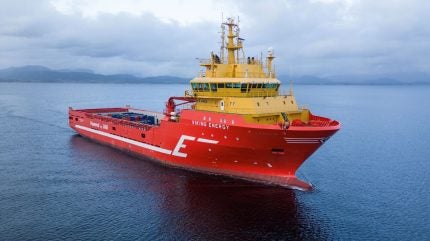
Norwegian offshore services company Eidesvik will operate the world’s first ammonia-powered platform supply vessel (PSV) after signing a contract with Wärtsilä for the conversion of the Viking Energy to a dual fuel engine.
The conversion will make the ship the first in-service vessel to convert to ammonia use according to Eidesvik, with the change to the W25 ammonia-MGO engine, referred to as the Apollo project, expected to be complete in 2026.
Eidesvik CEO Gitte Gard Talmo said: “If we are to succeed in shipping’s green transition then close collaboration throughout the value chain is imperative. No one can succeed in isolation.
“As such, we hope the Apollo project can work as an example of how to embrace and build strong partnerships, working together to achieve collective aims.”
While the vessel is owned by Eidesvik, the ammonia project will be funded by Norway’s state energy company Equinor, which has chartered the Viking Energy since it launched in 2003 and will use the vessel for a project in the North Sea after its conversion.
Project Apollo will also be supported by a €5m ($5.6m) grant from the EU’s Horizon Europe programme thanks to a partnership with cluster organisation Maritime CleanTech, adding to the Viking Energy’s role as a demonstrator vessel for ammonia fuel cells in the EU-funded ShipFC project.

US Tariffs are shifting - will you react or anticipate?
Don’t let policy changes catch you off guard. Stay proactive with real-time data and expert analysis.
By GlobalDataThe vessel has been a case study for green fuels throughout its life, launching as the first offshore vessel to be powered by LNG before becoming the first hybrid with a ‘Battery Power’ notation from classification society DNV after an initial conversion in 2016.
Wärtsilä CEO Håkan Agnevall said: “In just 25 years – the lifetime of a single vessel – shipping needs to get to net zero emissions. Achieving this will require coordinated action by all maritime industry stakeholders to bring about the system change needed to accept a new generation of sustainable fuels.”
“With this new contract, together with Eidesvik, Wärtsilä is proud to be at the forefront of this movement.”
As one of many alternative fuels in development, Ammonia has not been the most popular choice for vessel operators looking to reduce their emissions but vessel designs using the fuel have recently been backed by major players including the Maersk Mc-Kinney Møller Centre for Zero Carbon Shipping and Samsung Heavy Industries.



